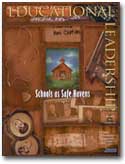Safe havens on the Web? Yes, here are sites that discuss schools-within-schools; programs that provide continuity and care for homeless, immigrant, or abused children; and ways to empower students to solve problems and resolve conflicts peacefully.
Education Plus
http://scov.csos.jhu.edu/talent/high.html. The Talent Development Model, exemplified at Patterson High School in Baltimore, Maryland, since 1995, builds new relationships among students and teachers by creating small academies within a large urban high school formerly plagued by poor attendance, violence in the halls, and a high dropout rate (see p. 14).
http://www.opendoor.com/hfh/. "Homes for the Homeless"—this site, sponsored by the Institute for Children and Poverty in New York City (director, Ralph Nunez—see p. 56) features American Family Inns, an innovative, full-service transitional shelter program that includes job training, child care, medical, and education services for more than 540 families each day.
http://www.clcrc.com. The Cooperative Learning Center: Co-Directors, David W. Johnson and Roger T. Johnson, who, with Laurie Stevahn and Peter Hodne, wrote "The Three Cs of Safe Schools" (see p. 8). Lots of content here in the "Cooperative Learning Newsletter" (Feb. 1997).
Here Comes the Law
http://www.ed.gov/legislation/ESEA/sec323.html. Here's Section 323 of the Stewart B. McKinney Homeless Assistance Act (42 U.S.C. 11431 et seq.). In brief, "Each State educational agency shall ensure that each child of a homeless individual and each homeless youth has equal access to a free, appropriate public education."
http://supct.law.cornell.edu/supct/. How about court decisions and laws on immigration? At Cornell University, search for recent and archived U.S. Supreme Court decisions. For the Illegal Immigration Reform and Immigrant Responsibility Act of 1996, see the "Thomas" site—"U.S. Congress on the Internet" (http://thomas.loc.gov). Also, the National Clearinghouse for Bilingual Education (http://www.ncbe.gwu.edu) has information on immigration, U.S. and state legislation, court decisions, and bilingual education.
http://www.pbs.org/cgi-bin/pov/learn_discuss/public/discuss.cgi. The Public Broadcasting Service Web site offers an online discussion of "Fear and Learning at Hoover Elementary," a documentary about children of undocumented immi-grants written and directed by a 4th grade teacher in Los Angeles.
Help for Children—and Self-Help
http://www.childrensdefense.org. The Children's Defense Fund (director, Marian Wright Edelman) "exists to provide a strong and effective voice for all the children of America, who cannot vote, lobby, or speak for themselves." For other sites with chat lines, links, and other resources for victims of child abuse, see Veritas Programming, Ltd., (http://www.sover.net:80/~schwcof/) and the National Child Rights Alliance (http://linux.hartford.edu/~jerry/ncra.html).
http://pubweb.ucdavis.edu/Documents/RPEP/invcstats.htm. The National Victim Center presents estimates and statistics on victims of rape: For example, the center estimates that 84% of rapes are not reported to police. Other disturbing findings: Three out of five rapes happen before age 18, and 3 out of 10 rapes happen before age 11 (see also http://www.honors.indiana.edu/~w131/statistics.html).
http://www.courses.edu/gang_resources.html. Need information on gangs? Go to the University of the Pacific and take a course: "Online Guide to Gang Signs and Graffiti," or "Gangs: Prevention, Remediation and Parent Conferencing." For social skills courses, see David Levine's site (http://members.aol.com/Heronpress/index.html).
http://www.sedl.org/culture/welcome.html. The Southwest Educational Development Laboratory (SEDL)'s newsletter, SEDLetter, has online articles about minority languages and other issues important to educators teaching children of immigrants.
http://www.gasou.edu/psychweb/psychweb.htm. PsychWeb, at Georgia Southern University, provides self-help resources and online discussion groups for people dealing with grief, abuse, attention deficit disorder, eating disorders, and substance abuse. And Pennsylvania State University (http://www.de.psu.edu/harass/analysis/schools.htm) provides an amazing array of resources on sexual harassment.
